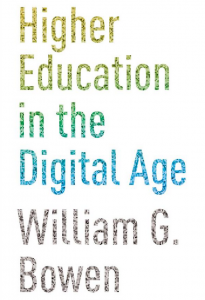Higher Education in the Digital Age – Book Review
 Higher education, particularly in the US, is on the verge of a major structural change. There has been a lot of speculation in recent years about the ever-increasing cost of higher education, the mounting student college debt (which has surpassed one trillion dollars this year), and the growing uncertainty of the job prospects even for college graduates. Hardly a week goes by without another major story in the media about some disconcerting aspects of the higher educational ecosystem. Books and articles (such as this one) proclaiming the existence of the higher-educational bubble pop out on a very regular basis. Rarely, however, have I had the opportunity to read an account of the current state of higher education from one of its more distinguished leaders. “Higher Education in the Digital Age” promises to be just such book.
Higher education, particularly in the US, is on the verge of a major structural change. There has been a lot of speculation in recent years about the ever-increasing cost of higher education, the mounting student college debt (which has surpassed one trillion dollars this year), and the growing uncertainty of the job prospects even for college graduates. Hardly a week goes by without another major story in the media about some disconcerting aspects of the higher educational ecosystem. Books and articles (such as this one) proclaiming the existence of the higher-educational bubble pop out on a very regular basis. Rarely, however, have I had the opportunity to read an account of the current state of higher education from one of its more distinguished leaders. “Higher Education in the Digital Age” promises to be just such book.
The book is based on the Tanner Lectures on Human Values delivered at Stanford University in the fall of 2012. The main lectures – and the bulk of this book – are written by William Bowen, former president of Princeton University. The rest of the book is comprised of the responses by some equally distinguished higher educational luminaries, including the current president of Stanford University. All of the contributors to this book are clearly very familiar with the virtues and the problems of the higher education. Stanford in particular has in recent years been investing a lot of time and resources on trying to make education more affordable and accessible – from increasingly more generous student financial aid packages, to the launching of its own online educational initiative. The online education seems to be one of the main directions in which the future of education is headed, and this book makes an assessment of its potential and pitfalls. It gives many interesting insights and “rebuttals” of the criticism of higher education. Its definitely worth reading in order to get the sense of what academic leaders are thinking right now as far as their own profession is concerned.
So what is the conclusion of this book? I don’t have the nitty-gritty economics expertise to do the full justice to the arguments presented in it. However, I have spent most of my professional life in the academia, and together with many years of undergraduate and graduate training I have a fairly good idea of the ills and the shortcomings of this system. My sense is that the “correction” to the higher-educational bubble is inevitable, and it’s more likely to happen sooner rather than later. Its effects, in turn, will probably be much more dramatic, in ways that we can’t fully appreciate right now, than what most people expect. With that in mind I think that this book is grossly underestimating the extent of the upcoming crisis. It proposes palliative measures where much more structurally radical changes are in order. After reading this book I was left with a renewed sense that the leaders in the Ivory Tower have managed to thoroughly immure themselves in their world and are largely impervious to the economic forces that affect all the other aspects of the modern world. They might present this as a virtue, but more and more people are increasingly viewing it as a potentially devastating defect. Their analysis of the current system may be correct as far as it goes, but I am afraid that we are on a verge of a truly radical educational revolution. I was reminded of what Henry Ford’s quipping that if he had listened to his customers he would have built a faster horse. Alas, after reading this book I got a sense that it was a valiant attempt to make a case for a faster higher educational horse.
There are no comments yet, add one below.
